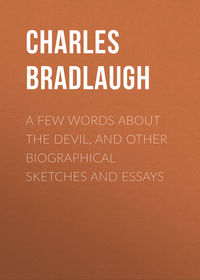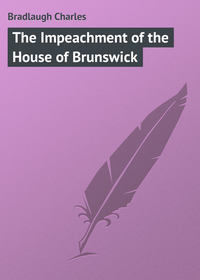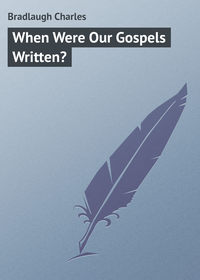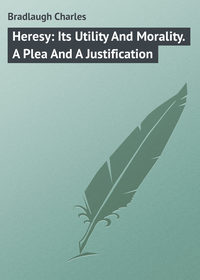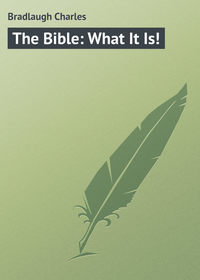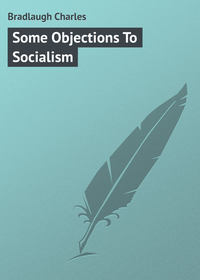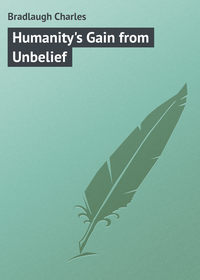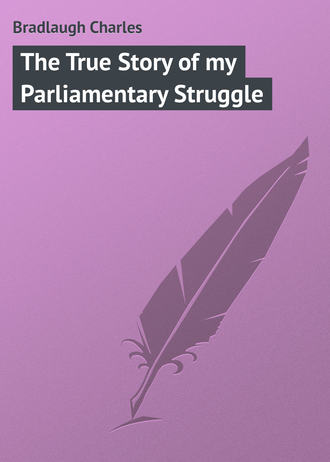
The True Story of my Parliamentary Struggle
July 1st. – After a futile attempt made by Mr. Gorst to show that Mr. Gladstone’s resolution was a disorderly one, the Premier, in moving it said, in the course of an extremely fair speech, that the allegation of members that Mr. Bradlaugh had thrust his opinions upon the House was untrue. His (Mr. Bradlaugh’s) reference to the Acts under which he claimed to affirm had only been named in answer to a question from the clerk of the House. Sir Erskine May, in his evidence before the recent committee, stated that Mr. Bradlaugh simply claimed to affirm.
Sir Stafford Northcote admitted that when Mr. Bradlaugh was called upon to affirm he was not disrespectful, but firm. He opposed the resolution as humiliating to the House. Several members protested against any course for facilitating the admission of Mr. Bradlaugh. General Burnaby stated that in order to obtain “authoritative” opinions on the matter he had obtained letters or telegrams from the Moravian body, the Bishop of London, the Roman Catholic Archbishop of Ossory, the Bishop of Ratho, the Archbishop of Dublin, the Bishop of Galway, and the Bishop of Argyle and the Isles, and the Secretary of the Pope of Rome, all of whom expressed themselves in the strongest terms against the admission of an Atheist into Parliament. Mr. Spurgeon, who was unfortunately from home, had expressed his opinion strongly adverse to it, and the Chief Rabbi – (loud laughter) – although refusing to interfere with political questions, felt very deeply on the subject. (Laughter, and cries of “the Sultan,” and “Shah.”)
When the House divided the numbers were 303 for, and 249 against.
July 2nd. – Mr. Bradlaugh takes the affirmation of allegiance, and his seat.
During the struggle several hundreds of indignation meetings were held in London and the provinces, and petitions, letters, telegrams, etc., in immense numbers, poured in upon the Government and the House, in favor of Mr. Bradlaugh’s rights.
July 2nd. – Mr. Bradlaugh gives his first vote, and was thereupon served with a writ to recover against him a penalty of £500 for having voted and sat without having made and subscribed the oath, the plaintiff being one Henry Lewis Clarke, who, as subsequently appeared, was merely the tool of the actual common informer, Charles Newdigate Newdegate, M.P. This writ was ready so quickly that, if not issued actually before Mr. Bradlaugh had taken his seat, it must have been prepared beforehand.
July 8th. – Mr. Norwood asks the first Lord of the Treasury whether, considering the Government declined to introduce a bill to amend the Oaths Act, it would instruct the law officers of the Crown to defend the junior member for Northampton against the suit of the common informer. Mr. Callan asked whether the Government would remit the penalty. Mr. Gladstone said no application had been received for remission of the penalties, and that his reply to Mr. Norwood must be in the negative.
July 14th. – Read first time in the House of Commons, a bill “to incapacitate from sitting in Parliament any person who has by deliberate public speaking, or by published writing, systematically avowed his disbelief in the existence of a supreme being.” It was prepared and introduced by Sir Eardley Wilmot, Mr. Alderman Fowler and Mr. Hicks. Owing to an informality the Bill could not come on for second reading.
The Rev. Canon Abney, of Derby, speaks of Mr. Bradlaugh as “the apostle of filth, impurity, and blasphemy.”
July 16th. – Parliament indemnifies Lord Byron against an action, he having sat and voted without being sworn.
July 20th. – Sir Eardley Wilmot gives notice of moving that it is repugnant to the constitution for an Atheist to become a member of “this Honorable House.” He afterwards postponed his motion.
At a meeting of the Dumfries Town Council, a member said: “If the law courts should decide that it was legal for an Atheist to sit in the House of Commons, he should feel it is duty to give notice of petition to Parliament to have the law altered; he would not allow Mr. Bradlaugh to go into a hundred acre field beside cattle, let alone the House of Commons.”
The Rev. Chas. Voysey writes, that he feels disgraced by the people of Northampton electing Mr. Bradlaugh, and declares that “most of the speeches in the Bradlaugh case in favor of his exclusion, strike me as singularly good, wholesome and creditable.” He repeats the myth of Mr. Bradlaugh forcing his objections to the oath upon the House.
July 21st. – Sir John Hay, M.P., speaking about Mr. Bradlaugh at New Galloway, made a most infamous, cowardly, and uncalled for attack on Mrs. Besant. The Scotsman refused to print the remarks, as “the language was so coarse that it could hardly have dropped from a Yahoo.”
Aug. 1st. – The Nineteenth Century prints “An Englishman’s Protest,” written by Cardinal Manning, personally directed against Mr. Bradlaugh.
Aug. 24th. – Mr. Bradlaugh gives notice that early next session he will call attention to perpetual pensions.
Sept. 7th. – Parliament prorogued. Hansard credits Mr. Bradlaugh with about twenty speeches during the Session. (Mr. Newdegate told the Licensed Victuallers that Mr. Bradlaugh “had made one speech, and proved himself a second or third-rate speaker.”)
1881Jan. 6th. – Parliament reopens. Mr. Bradlaugh renews his notice as to perpetual pensions. Great interest in the question throughout the kingdom.
Jan. 24th. – Mr. Bradlaugh makes a speech in the House of Commons against Coercion in Ireland.
Jan. 31st. – Mr. Newdegate, speaking in the House, described Northampton as an “oasis in the Midland Counties.”
Feb. 4th. – Mr. Bradlaugh makes a speech against the second reading of the Coercion Bill, and concluded by moving that it be read that day six months.
Feb. 15th. – Date of motion for inquiry into perpetual pensions fixed for March 15th. (When the day arrived Mr. Bradlaugh, on an appeal from Mr. Gladstone, allowed the motion to be postponed, in order to allow supply to be taken. 848 petitions had been presented to the House, with 251,332 signatures in favor of the motion.)
Feb. 17th. – Mr. Dawson, M.P. for Carlow, said that Irish members were much indebted to Mr. Bradlaugh for what he had done on the Coercion Bill.
Feb. 25th. – Mr. Bradlaugh made final speech against third reading of the Coercion Bill.
March 7th. – The case of Clarke v. Bradlaugh heard by Mr. Justice Mathew.
March 10th. – Mr. Bradlaugh brought before the House the case of the imprisoned Maoris.
March 11th. – Judgment in the case given, which was for the plaintiff, that he was entitled to recover the penalty, subject to appeal. Mr. Bradlaugh gave notice of appeal.
Mr. Gorst gave notice to move that Mr. Speaker issue his warrant for new writ for the borough of Nottingham [!].
March 14th. – Upon Mr. Bradlaugh rising to present petitions against perpetual pensions, signed by over 7,000 persons, Mr. Gorst rose to order, on the ground that the seat for Northampton was vacant. After discussion the Speaker called upon Mr. Bradlaugh to proceed with the presentation of his petitions.
March 15th. – At request of Mr. Gladstone, Mr. Bradlaugh postponed his motion for enquiry into perpetual pensions.
March 23rd. – Mr. Bradlaugh moved the Court of Appeal to expedite the hearing of his appeal, and also to expedite the trial of the issues in fact. The Court gave the appeal priority over other cases.
March 28th. – Mr. Bradlaugh made his last speech in the House against flogging in the Army.
March 30th. – Appeal heard.
March 31st. – Judgment given against the defendant. Plaintiff not yet entitled to execution, but seat vacated, Mr. Bradlaugh undertaking not to appeal so far as the affirmation was concerned.
Mr. Bradlaugh again seeks the suffrages of the electors of Northampton.
April 6th. – The Tories serve notice on the Mayor not to accept Mr. Bradlaugh’s nomination, which the Mayor disregarded. Mr. Edward Corbett nominated by Tories.
April 9th. – Mr. Bradlaugh re-elected by 3,437 votes to Corbett 3,305.
April 26th. – Mr. Bradlaugh, accompanied by Mr. Labouchere and Mr. Burt, came to the table of the House, and, “the book” having been handed to him, was about to take the oath when Sir Stafford Northcote interposing, he was requested to withdraw, in order that the House might consider the new conditions under which the oath was proposed to be taken. Mr. Bradlaugh withdrew to the bar of the House, and Sir Stafford Northcote moved that he be not allowed to go through the form of taking the oath. Mr. Davey moved and Mr. Labouchere seconded an amendment to the effect that where a person who had been duly elected presented himself at the table to take the oath he ought not to be prevented from doing so by anything extraneous to the transaction. Other members spoke, and Mr. Bright regretted “the almost violent temper with which some hon. gentlemen came to the consideration of the question.”
Mr. Bradlaugh, speaking at the bar, claimed that his return was untainted, that it had not been brought about by the Liberal party, but by the help of the people, by the pence of toilers in mine and factory. He begged the House not to plunge into a struggle with him, which he would shun. Strife was easy to begin, but none knew where it would end. There was no legal disqualification upon him, and they had no right to impose a disqualification which was less than legal.
Mr. Gladstone made a lengthy and fine speech in favor of Mr. Bradlaugh, the text of which was Mr. Bradlaugh’s own words given above as to imposition of a new disqualification; on a division, however, the bigots again had it.
Mr. Bradlaugh again stepped to the table, and demanded the administration of the oath, refusing to obey the Speaker’s order to withdraw. Sir Stafford Northcote asked the Prime Minister whether he proposed to offer the House any counsel. Mr. Gladstone said he should leave it to the majority to carry out the effects of their vote. Eventually the Speaker called upon the Sergeant-at-Arms to remove Mr. Bradlaugh, who during the debate had been standing at the table. Mr. Bradlaugh withdrawing with the Sergeant three times to the bar, as often returned to the table. After further passages at arms between Mr. Gladstone and Sir Stafford Northcote, the House adjourned.
April 27th. – Mr. Bradlaugh again found at the table of the House claiming to be allowed to take the oath. At the bidding of the Speaker the Sergeant-at-Arms again caused Mr. Bradlaugh to withdraw to the bar, where he remained during the discussion which followed.
Mr. Labouchere asked the Prime Minister whether he would give him reasonable facilities to introduce his Affirmation Bill, if so Mr. Bradlaugh would not interfere with the resolution passed last night.
Mr. Gladstone said the giving facility for that purpose, meant the postponement of very serious and very urgent business, and he had no assurance as to the disposition of the House. He could not see his way to consent if it was to be an opposed Bill. After further discussion, however, Mr. Gladstone said it might be possible to test the feeling of the House by one or more morning sittings.
April 29th. – Mr. Gladstone announces the intention of the Government of bringing in a bill amending the Parliamentary Oaths Act.
May 2nd. – The Attorney-General moved that the House resolve itself into committee with a view of his asking leave to introduce the Bill. Debate on motion adjourned to the 5th with the view of fixing the time on the 6th, when the discussion should be resumed.
Mr. MacIver gave notice to ask the Prime Minister whether he was prepared to reconsider his decision of last session, and will introduce “a short measure” for the partial disfranchisement of Northampton. (The question was never put.)
May 6th. – Further obstruction of the Bigots.
May 10th. – After 1.15 a.m. the Government proposed a morning sitting for that day (Tuesday), to discuss the introduction of their Bill. Further obstruction, wrath, and bitterness, and the Government abandoned the intention to hold a morning sitting.
At the afternoon sitting a resolution was arrived at, which authorised the Sergeant-at-Arms to prevent Mr. Bradlaugh from entering the House.
Lord Selborne (Lord Chancellor) in reply to a letter relative to Mr. Bradlaugh and the oath, says equal justice is due to Christian and infidel; he saw no possibility of refusing to afford by legislation to all who scruple to take the oath, the same option in Parliament as they have in courts of law, to make an affirmation.
May 25th. – Mr. Newdegate formally blocked the Bill, of which Mr. Labouchere gave notice, for indemnifying Mr. Bradlaugh against penalties for having sat and voted on affirmation.
June 19th and 20th. – The common informer’s action tried at Nisi prius before Mr. Justice Grove. Verdict against Mr. Bradlaugh for penalty and costs. —Rule nisi for new trial afterwards, granted by Justices Grove and Lindley; this rule was made absolute by Justices Denman and Hawkins, but was set aside by Lords Justices Brett, Cotton and Holker.
Mr. Bradlaugh appeals to the country. The country answers.
Aug. 3rd. – Mr. Bradlaugh, acting on his right to enter the House of Commons, is seized at the door of the House by fourteen men, police and ushers (Inspector Denning said ten), and roughly hustled out into Palace Yard, Mr. Bradlaugh protesting against such treatment as illegal. “In the passage leading out to the yard Mr. Bradlaugh’s coat was torn down on the right side; his waistcoat was also pulled open, and otherwise his toilet was much disarranged. The members flocked down the stairs on the heels of the struggling party, but no pause was made until Mr. Bradlaugh was placed outside the precincts and in Palace Yard.” —Times. Alderman Fowler was heard to call, “Kick him out.” This he afterwards denied, but there is evidence that he did so. (Mr. Bradlaugh suffered the rupture of the small muscles of both his arms, and erysipelas ensued).
Many thousands of people went up to the House with petitions, urging the House to do justice to Northampton and Mr. Bradlaugh.
In the House Mr. Labouchere moved a resolution condemning, as an interference with the privilege of members, the action of the authorities in expelling Mr. Bradlaugh from the lobby. This was rejected by 191 votes against 7, and a motion of Sir Henry Holland, declaring the approval of the House of the course taken by the Speaker, was agreed to without controversy.
At a crowded meeting at the Hall of Science the same evening Mr. Bradlaugh stated that he had told Inspector Denning in Palace Yard that he could come back with force enough to gain admittance, but that he had no right to risk the lives and liberties of his supporters.
Aug. 4th. – The Times declares, in an article favorable on the whole to Mr. Bradlaugh’s claims, that the House of Commons was yesterday the real sufferer in dignity, authority, and repute. It says: “the question contains within itself the baleful germ of a grave constitutional contest between the House of Commons and any constituency in the land;” and “such a conflict can but have one conclusion, as all history shows.”
The Daily News, in a similar article, concludes thus: “Sooner or later it will be generally acknowledged that Mr. Bradlaugh’s exclusion was one of the most high-handed acts of which any legislative body has ever been guilty.”
The following unique paragraph from The Rock is worth preserving in its original form: “The question now is whether the Christian people of this realm will quietly allow clamorous groups of infidels, Radicals, and seditionists, by organised clamor, bluster, and menace, to overawe the legislature, and by exhibitions of violence – not at all unlikely, if permitted to develop into outrage and riot – to cause an organic and vital change to be made in our Constitution and laws, in order that brazen-faced Atheism might display itself within the walls of the British Parliament.”
Mr. E. D. Girdlestone writes: “If the present Cabinet does not secure your admission to the House in some way or other, I can only wish they may soon be turned out of office. I don’t know what more I can do than say, ‘Go on! and go in!’”
Aug. 5th. – Mr. Bradlaugh’s application at Westminster Police Court for summons against Inspector, for having assaulted him at the House of Commons on the 3rd inst., refused.
Mr. Bradlaugh confined to the House with severe erysipelas in both arms, resulting from the injuries inflicted. Attended by Drs. Ramskill and Palfrey. The latter, on August 12th, ordered his immediate removal from town, to prevent yet more dangerous complications.
Aug. 13th. – Mr. Bradlaugh went to Worthing to recruit his health. Outside the station there, weary and exhausted, both arms in a sling, he was rudely stared at by a clergyman, who, having satisfied himself as to Mr. Bradlaugh’s identity, walked away saying loudly: “There’s Bradlaugh; I hope they’ll make it warm for him yet.”
The Northern Star (a Tory paper) suggested that Mr. Bradlaugh was malingering – “simply carrying on the showman business.”
Aug. 24th. – Sir Henry Tyler, in the House of Commons, attempts to discredit the South Kensington department for allowing science and art classes at the Hall of Science. Mr. Mundella gives those classes great credit.
Aug. 27th. – Parliament prorogued.
Further appeal to England.
1882Jan. 9th. – The Earl of Derby, in a speech at the Liverpool Reform Club, says: “For my part I utterly disbelieve in the value of political oaths… I should hope that if Mr. Bradlaugh again offers to take the oath, as he did last year, there will be no further attempt to prevent him.”
Feb. 7th. – Reopening of Parliament. Mr. Bradlaugh again attended at the table to take the oath, and Sir Erskine May, the clerk of the House, was about to administer the same when Sir Stafford Northcote, interposing, moved that Mr. Bradlaugh be not allowed to go through the form. Sir W. Harcourt, in moving the previous question, said the Government held the view that the House had no right to interpose between a duly-elected member and the oath.
Mr. Bradlaugh, addressing the House from the bar for the third time, begged the House to deal with him with some semblance and show of legality and fairness. He concluded: “I want to obey the law, and I tell you how I might meet the House still further, if the House will pardon me for seeming to advise it. Hon. members had said that an Affirmation Bill would be a Bradlaugh Relief Bill. Bradlaugh is more proud than you are. Let the Bill pass without applying to elections that have taken place previously, and I will undertake not to claim my seat, and when the Bill has passed I will apply for the Chiltern Hundreds. I have no fear. If I am not fit for my constituents they shall dismiss me, but you never shall. The grave alone shall make me yield.”
When a division was taken there were for the previous question 228, against 286. Mr. Samuel Morley voted with the majority against the Government. Sir Stafford Northcote’s motion was then agreed to without a division.
Feb. 8th. – Mr. Labouchere, in committee of the whole House, proposed for leave to bring in a Bill to amend the law of Parliamentary Oaths and Affirmations. The Bill was afterwards formally blocked by Mr. Molloy.
Feb. 17th. – Mr. Labouchere asked the Attorney-General whether the resolution of Feb. 7th had not vacated the seat. Sir Henry James answered that it had not.
Feb. 18th. – Mr. Gladstone writes Mr. Bradlaugh that the Government have no measure to propose with respect to his seat.
Feb. 21st. – Mr. Bradlaugh of himself takes and subscribes the oath, and takes his seat.
Feb. 22nd. – Mr Bradlaugh expelled the House of Commons.
Mar. 2nd – Re-elected for Northampton. For Bradlaugh, 3,796; for Corbett, 3,688.
Mar. 6th. – On the motion of Sir Stafford Northcote, the House reaffirms its motion of the 7th Feb., Mr. Gladstone supporting an amendment moved by Mr. Marjoribanks, by which the House would have declared the desirability of legislation, for the purpose of giving members an option between oath and affirmation.
Mar. 7th. – Lord Redesdale introduces in the House of Lords a Bill, requiring every peer and every member of the House of Commons before taking the oath or making the affirmation, to declare and affirm his belief in Almighty God. The Bill, introduced “from a sense of what was due to Almighty God,” was afterwards withdrawn “in deference to Lord Salisbury.”
To this date, 317 petitions with 62,168 signatures had been presented against Mr. Bradlaugh being allowed to take his seat; while in favor of the same 1,051, with 250,833 signatures, had been presented.
Mr. Labouchere’s Affirmation Bill blocked by Earl Percy.
1883Jan. 11th. – Mr. Justice Field gave judgment that the privileges of the House of Commons prevented Mr. Bradlaugh from obtaining any redress for the assault upon him on August 3rd, 1881.
Feb. 15th. – Great demonstration in Trafalgar Square; from eighty to one hundred thousand people present. (Evening Standard says 30,000; Daily News, 50,000 an hour before the meeting.) Mr. Adams, chairman; Rev. W. Sharman, Jos. Arch, and Mr. Bradlaugh, speakers.
Opening of Parliament. (Mr. Gladstone at Cannes.) Government give notice for to-morrow for leave to introduce bill to amend the Oaths Act, 1866. Sir R. Cross gives notice of opposition on second reading of same. Mr. Bradlaugh consents, with the approval of his constituents, expressed on the 13th inst., to await the fate of the measure.
Feb. 16th. – Sharp succession of frantic speeches in the House of Commons by Mr. Newdegate, Alderman Fowler, Mr. Warton, Mr. Henry Chaplin, Mr. Onslow, Mr. Grantham, Mr. Beresford Hope, Lord H. Lennox, Lord C. Hamilton, Mr. A. Balfour, Mr. Ashmead Bartlett, and Mr. A. O’Connor. Divisions: from two to three to one for Government. The Marquis of Hartington consents to adjourn the motion for Bill until Monday at twelve.
Feb. 18th. – The Observer says that when Conservatives ask Liberals whether they really mean to alter the law for the purpose of admitting Mr. Bradlaugh, it is fair for Liberals in turn to ask Conservatives whether they really mean to maintain an admitted abuse and injustice for the mere purpose of excluding Mr. Bradlaugh.
Feb. 19th. – First reading of Bill carried on division by 184 votes to 53; second reading formally fixed for that night week.
Feb. 20th. —Daily News says Bill will be carried by large majorities, and will be regarded by the House and the country as the appropriate settlement of an unfortunate controversy.
The Times says the leaders of the opposition will not succeed in finally preventing the Bill from becoming law. Its real concern is that Mr. Bradlaugh has been substantially in the right; that he has been unjustly excluded from taking the seat which belongs to him.
The Morning Advertiser thinks the Government may yet find it difficult to persuade the House to adopt the Bill.
The Morning Post justifies the irregular opposition to the first reading of the Bill, and thinks notice of the measure should have been given in the Queen’s Speech. No measure had created more excitement or raised more indignation in the country, which desired to see it rejected by a decisive majority.
March 5th. – Appeal case Bradlaugh v. Clarke part heard before the House of Lords.
March 6th. – Case concluded; judgment deferred.
March 9th. – Action for maintenance – Bradlaugh v. Newdegate – tried before Lord Coleridge and a special jury. Henry Lewis Clarke, the common informer, swore that he had not the means to pay the costs, and would not have brought the action if he had not been indemnified by Mr. Newdegate. Case adjourned for argument of legal points.
March 17th. – Maintenance action argued; four counsel appearing for Mr. Newdegate. Lord Coleridge reserved judgment.
March 20th. – The Solicitors to the Treasury compelled Mr. Bradlaugh to pay the costs of the House of Commons in the action against the deputy Sergeant-at-Arms.


